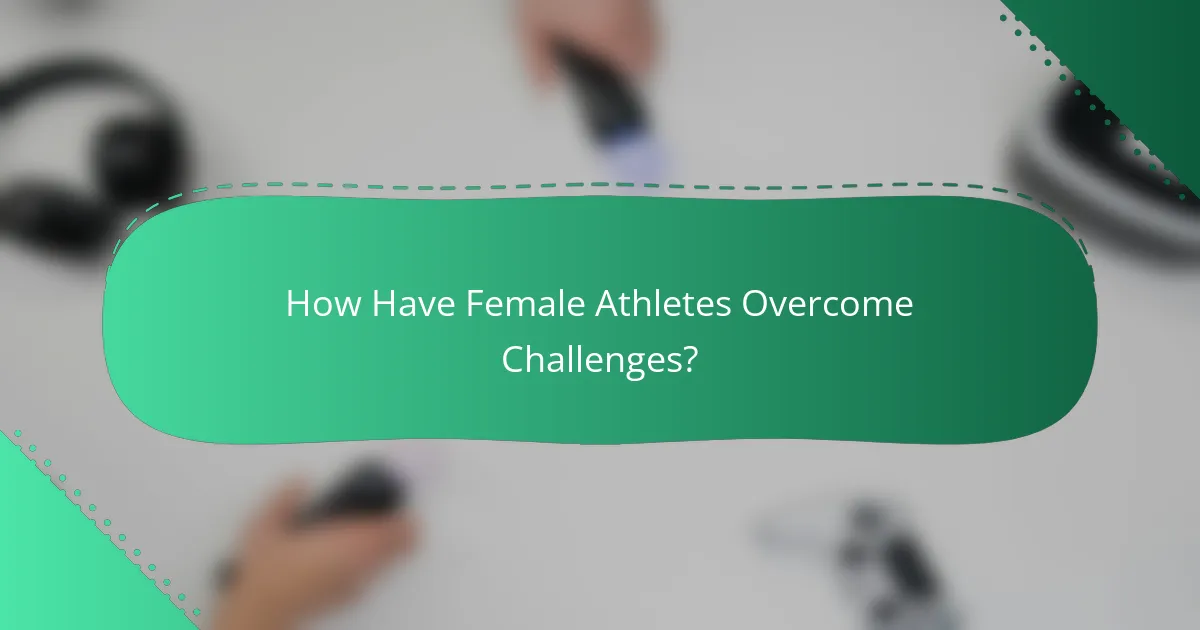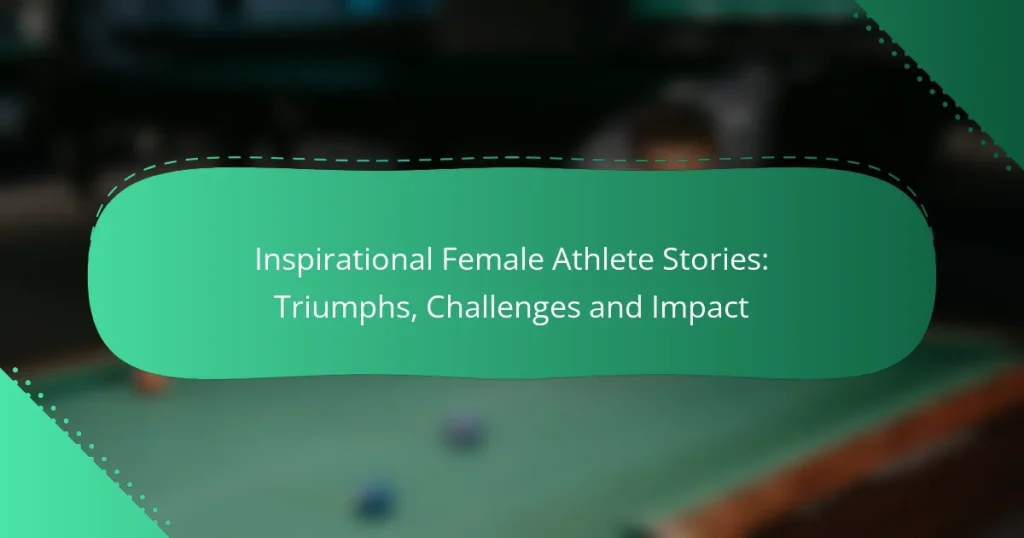Inspirational female athlete stories showcase the incredible journeys of women who have triumphed over adversity to achieve greatness in sports. These narratives not only highlight their personal victories but also emphasize their profound impact on society, serving as role models and advocates for gender equality in athletics and beyond.

What Are Inspirational Female Athlete Stories?
Inspirational female athlete stories highlight the journeys of women who have overcome challenges and achieved remarkable success in sports. These narratives not only celebrate their triumphs but also demonstrate their impact on society and the sports culture as a whole.
Profiles of trailblazers
Trailblazing female athletes have paved the way for future generations by breaking barriers in their respective sports. Figures like Serena Williams in tennis and Mia Hamm in soccer have not only excelled in their fields but have also used their platforms to advocate for gender equality and social justice.
These athletes often face unique challenges, including gender bias and limited opportunities. Their stories serve as powerful reminders of resilience and determination, inspiring young girls to pursue their athletic dreams.
Impact on sports culture
The impact of inspirational female athletes extends beyond their individual achievements; they have transformed sports culture by challenging stereotypes and promoting inclusivity. Initiatives like the Women’s Sports Foundation have emerged to support female athletes and increase visibility in traditionally male-dominated sports.
As more women gain recognition in sports, the narrative around female athletes continues to evolve, encouraging greater participation and support from fans and sponsors alike. This shift is crucial for fostering a more equitable sports environment.
Examples of resilience
Resilience is a common theme in the stories of female athletes who have faced adversity. For instance, Olympic gymnast Simone Biles has openly discussed her mental health struggles, emphasizing the importance of prioritizing well-being over competition.
Additionally, athletes like Danica Patrick have navigated a male-dominated racing industry, proving that perseverance can lead to groundbreaking achievements. Their experiences highlight the strength required to overcome obstacles and inspire others to do the same.

How Have Female Athletes Overcome Challenges?
Female athletes have overcome numerous challenges through resilience, determination, and support from their communities. They face personal struggles, systemic barriers in sports, and often rely on mentorship to navigate their paths to success.
Personal struggles and triumphs
Many female athletes confront personal challenges such as injuries, mental health issues, and balancing sports with family or education. For example, elite athletes often deal with the pressure of performance expectations, which can lead to anxiety or burnout.
Triumphs often emerge from these struggles, as athletes learn to manage their mental and physical health. Stories of overcoming adversity, such as returning from a significant injury or achieving personal bests despite setbacks, inspire others and highlight the strength of female athletes.
Barriers in sports
Female athletes frequently encounter barriers such as unequal pay, lack of media coverage, and limited access to facilities. For instance, in many sports, prize money for women is significantly lower than for men, which can discourage participation and investment in women’s sports.
Additionally, societal stereotypes and biases can hinder female athletes from receiving the same opportunities as their male counterparts. Addressing these barriers requires advocacy for equal treatment and increased visibility of women’s sports in the media.
Support systems and mentorship
Support systems play a crucial role in helping female athletes navigate challenges. This includes family, friends, coaches, and organizations that promote women’s sports. Having a strong support network can provide encouragement and resources necessary for success.
Mentorship is particularly valuable, as experienced athletes can guide younger ones through the complexities of their sports careers. Programs that connect aspiring female athletes with mentors can foster growth, resilience, and a sense of community, ultimately leading to greater achievements in sports.

What Impact Do Female Athletes Have on Society?
Female athletes significantly influence society by serving as role models, advocating for gender equality, and shaping sports policies. Their achievements inspire young girls to pursue sports, while their activism promotes equal opportunities in athletics and beyond.
Role models for young girls
Female athletes serve as powerful role models for young girls, demonstrating that dedication and hard work can lead to success in sports and life. Icons like Serena Williams and Simone Biles inspire girls to break barriers and pursue their passions, fostering a culture of ambition and resilience.
By showcasing their skills and achievements, these athletes encourage girls to participate in sports, helping to build confidence and self-esteem. Programs that highlight female athletes often lead to increased participation rates among young girls in various sports.
Advocacy for gender equality
Many female athletes actively advocate for gender equality, using their platforms to address disparities in pay, media coverage, and opportunities in sports. Initiatives like the #EqualPay campaign highlight the need for equal compensation for male and female athletes, pushing organizations to reevaluate their policies.
These athletes often collaborate with organizations to promote legislation aimed at ensuring equal rights and protections in sports. Their advocacy not only impacts the sports world but also resonates in broader societal discussions about gender equality.
Influence on sports policies
Female athletes have played a crucial role in shaping sports policies, influencing decisions that affect funding, training, and competition opportunities. Their experiences shed light on the need for more inclusive practices within sports organizations.
For example, the push for Title IX compliance in the United States has been significantly bolstered by female athletes advocating for equal treatment in educational sports programs. This has led to increased funding and resources for women’s sports at various levels.

Which Digital Products Highlight Female Athlete Stories?
Digital products that showcase female athlete stories include documentaries, books, and podcasts. These mediums provide insights into their triumphs, challenges, and the impact they have on sports and society.
Documentaries and films
Documentaries and films are powerful tools for telling the stories of female athletes. They often combine interviews, archival footage, and dramatic reenactments to create compelling narratives that highlight personal and professional milestones.
Popular examples include “The Dawn Wall,” which, while focused on climbing, features female athletes and their journeys. These films can inspire viewers and raise awareness about gender equality in sports.
Books and biographies
Books and biographies offer in-depth perspectives on the lives of female athletes, detailing their struggles and achievements. They often include personal anecdotes, training regimens, and reflections on their impact in their respective sports.
Titles such as “Open” by Andre Agassi, while primarily about his life, also touches on the contributions of female athletes. These works can serve as motivational resources for aspiring athletes and fans alike.
Podcasts and interviews
Podcasts and interviews provide a platform for female athletes to share their stories directly with audiences. These audio formats allow for candid discussions about their experiences, challenges, and victories in a more personal and engaging way.
Shows like “The Female Athlete Podcast” focus on various sports and feature interviews with athletes, coaches, and sports professionals. This format can foster community and support among listeners who share similar interests or aspirations.

How Can We Support Female Athletes?
Supporting female athletes involves actively engaging with their narratives, investing in women-led initiatives, and promoting events that showcase their talents. By taking these steps, we can create a more inclusive environment that empowers women in sports.
Engaging with their stories
Listening to and sharing the stories of female athletes is crucial for raising awareness about their challenges and triumphs. These narratives can inspire others and highlight the importance of gender equality in sports. Consider following athletes on social media, reading their biographies, or watching documentaries that feature their journeys.
Engagement can also take the form of community discussions or workshops that focus on the experiences of female athletes. This not only fosters a deeper understanding but also builds a supportive network that encourages young girls to pursue sports.
Supporting women-led initiatives
Investing in women-led sports initiatives is essential for creating sustainable change. This can include supporting organizations that promote female participation in sports, such as local leagues or training programs. Donating time or resources to these initiatives can have a significant impact on their success.
Look for opportunities to volunteer or sponsor events that focus on empowering women in athletics. Many organizations offer programs specifically designed to uplift female athletes, providing them with the resources they need to thrive.
Promoting female sports events
Promoting female sports events is vital for increasing visibility and support for women athletes. Attend local games, share event information on social media, and encourage friends and family to participate. Increased attendance can lead to better funding and sponsorship opportunities for female teams.
Consider organizing community events that celebrate female sports, such as exhibitions or charity matches. These gatherings not only showcase talent but also foster a sense of community and support for women in athletics.


